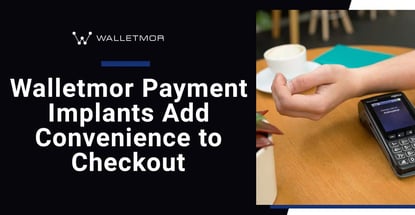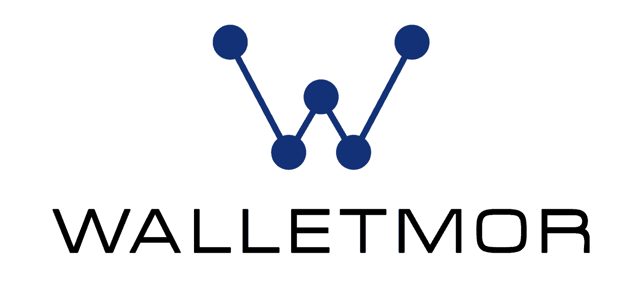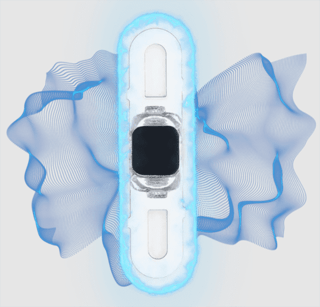
Our experts and industry insiders blog the latest news, studies and current events from inside the credit card industry. Our articles follow strict editorial guidelines.
In a Nutshell: Walletmor brings 22nd-century technology to the present day with its implant technology that brings contactless payments and expanded NFC (near-field communication) utility to – quite literally – the palm of your hand. The company provides implants embedded with an NFC chip that you surgically insert into your hand. The chips meet the highest health and safety standards required wherever they are available. The chips are linked to an app on your phone. The app sends your payment data to the chip for tap-to-pay use and can also take advantage of other common NFC functionality, such as unlocking doors.
The day we don’t have to carry anything with us other than our smartphones is one step closer to reality. Walletmor’s innovative chips that are implanted right into your hand are eliminating the need to carry your credit and debit cards everywhere you go.
The growing technology space has unlimited potential. One Tesla owner decided that taking his keys with him was too much of a hassle – so he put the keys’ microchip into his hand so he never has to worry about losing or forgetting them.
Walletmor takes that same technology and expands on it. The chips customers receive are meant to replace credit cards, but their functionality goes beyond just payment solutions.

Walletmor CEO and Founder Wojtek Paprota got the idea for implants for convenience in a sci-fi book he was reading. After doing more research, Paprota partnered with an expert in the implant space who had been developing and selling implants for almost 10 years.
Together, the pair created a custom implantable chip with tap-to-pay functionality. Several test products later, Paprota successfully implanted the chip into his own hand .
“After 11 months, we managed to build a working prototype,” Paprota said. “I implanted it in my hand in March 2020 and it was super amazing for me to share my ideas and concepts with those around me.”
Paprota didn’t initially intend on creating a business from his successful implant, but after requests from others, he decided to sell it through Walletmor. The chip itself only costs a few hundred dollars and requires a short procedure from one of many Walletmor recommended specialists around the world.
Tested With the Top Safety and Security Standards
Customer health is the top priority for Walletmor. That’s why the company tested the implants with the same tests medical devices must pass to receive certification, despite the fact that the implant is not a medical device.
Walletmor said the implant does not impact the customer’s health in any way. The stringent tests show that the device does not react negatively with the body’s cells.
“The results were positive,” Paprota said. “There were no signs that it may be dangerous. The implant is super safe and 100% biocompatible.”

Once it’s ordered, the implant arrives in a professionally packed and sterile package ready for insertion. The implant should not be handled by the customer. Specialists who insert the implant into the hand can take the implant out of the packaging to ensure a clean and safe insertion process.
Walletmor’s implants follow the same security protocols and standards all wearables and contactless cards currently have. The technology makes it impossible to read and write data onto the implant just by having another device close to it.
The implants require additional authorization to make changes to them, such as from the app associated with the implant. This security is called 3-D secure, which provides connection encryption and is the same protection all wearables, such as the Apple Watch, have.
The implant does not transmit radio waves nor does it have a battery inside. The implant is activated by putting it up to the checkout system to purchase products. Walletmor said it would be very hard for hackers to try and scan the implant due to its small size and small sweet spot area for scanning.
Applications Extending Past Payment Functionality
Walletmor said implants are the evolution of wearable technology and the company is already starting to see technology innovations that favor implants.
The company pointed to advances in vaccine documents, government ID, and payment systems that allow phones to store them. Walletmor’s implants have the same functionality to store identification and payment information without the inconvenience of having to pull them up.

Walletmor said it has sold almost 1,000 implants around the world. The enthusiasm shows people are ready for the advancements implants provide.
“As long as the implant is more secure and convenient while also being faster and cheaper than the alternatives, then whether we want it to or not, it will set the market,” Paprota said.
Paprota also said that people who see the implants in action are excited and curious about the technology. He said he hasn’t seen people turn down the idea of an implant that can make their lives easier.
“Sometimes people really go crazy about it,” Paprota said. “They really engage me in conversation every time I use the implant to make a payment and the result is usually a positive surprise.”
Building a More Convenient System
Walletmor’s implants promise two very key features: ultimate convenience and ultimate security. The ultimate convenience comes from a device that is always there and is available whenever. The ultimate security comes in the form of a device that you can’t lose or forget because it’s always with you.
Customers can put in their implant as soon as they receive it. Anyone who wishes to take out the implant can do so safely without any health impact.
The implants are designed to be easy to insert and take out. Walletmor’s implants do have expiration dates when the chip will not work with payment systems. But the implants still have the NFC capability to open doors, unlock computers, and any other functionality NFC chips bring.
“You can use it for anything as long as it matches the NFC communication protocol,” Paprota said. “90% of devices and systems around the world use the NFC protocol we use.”
The specific implant customers receive depends on where they live. Europeans receive implants with iCard support that expire in 2030, while Americans receive chips with Purewrist support that expire in 2024.
Walletmor is currently developing technology that will pair the implant with a smartphone to extend the expiration date of the implant. Advancements in technology will expand how the implant is used and eliminate expiration dates.
Walletmor is also looking into ways to make the chip even smaller so people are not discouraged by the insertion process. The next generation of implants will be injectable — making them easier to install and removing the requirement that they must be inserted by a specialist.


![7 Best Contactless Credit Cards ([updated_month_year]) 7 Best Contactless Credit Cards ([updated_month_year])](https://www.cardrates.com/images/uploads/2019/10/Contactless-Credit-Cards-Feat.jpg?width=158&height=120&fit=crop)
![5 Bank of America Contactless Credit Cards ([updated_month_year]) 5 Bank of America Contactless Credit Cards ([updated_month_year])](https://www.cardrates.com/images/uploads/2023/05/Bank-of-America-Contactless-Credit-Cards.jpg?width=158&height=120&fit=crop)





![5 Bad Credit Auto Loans With No Down Payment ([updated_month_year]) 5 Bad Credit Auto Loans With No Down Payment ([updated_month_year])](https://www.cardrates.com/images/uploads/2023/06/Bad-Credit-Auto-Loans-With-No-Down-Payment.jpg?width=158&height=120&fit=crop)